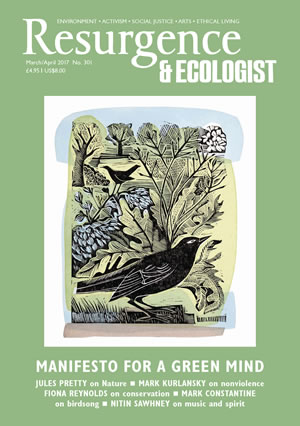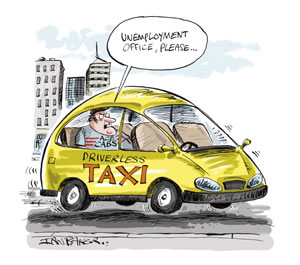Singapore. Mid-morning. I’m sitting in the back of a white Mitsubishi with Timandra, my co-presenter from the BBC Radio 4 programme FutureProofing, when our car does exactly what we are praying it’s not going to do. On a four-lane highway, with a dumpster truck heading towards us, our car swerves confidently into the oncoming traffic.
I forgot to mention that this is a driverless car.
We sit there, wrong side of the road, about to be dumpstered. Then the truck driver clocks us – glass-eyed scanner, Dalek-like, on our roof – and, too stunned to hoot, just grinds to an emergency halt.
We face off, a big vehicular metaphor for the future of the Singaporean economy, mass production against algorithm. Then our emergency, flesh-and-blood driver grabs the wheel and yanks us back on track.
Singapore may not be there yet, but the ambition is absolute: full automation. “The social costs of migrants are too high,” a government official tells us. “With automation we don’t need them.” It sends shivers down my spine. You can see the direction of travel: first automation, then universal basic income for the jobless, then walls to stop migrants from seeking the benefits of entry.
Delhi. Singapore’s not alone. In the US, some 3.6 million truck drivers are facing automation, and by 2035, according to an Oxford Martin School study, so are some 47% of white-collar jobs. In India, according to a recent World Bank report, a staggering 69% of jobs will be lost in the next 20 years.
I drive through the smog of Delhi to talk to Nikhil Dev, one of the leaders of the workers’ movement campaigning against automation. “We don’t want handouts,” Dev comments. “We want work.” Even if the streets are unbreathable, he tells me, we want our taxi drivers to have work. If the choice is handouts or manual labour we will demand labour. India has now passed the landmark Employment Guarantee Act, guaranteeing rural workers a minimum hundred days of paid work per year.
The air’s worse the next day. Genocidal, India’s High Court has called it, with schools closed and airborne levels of particulate matter 2.5 soot sixteen times over the World Health Organization limit. But Delhi’s School for the Blind is still open, and at its Lodhi Road campus, India’s blind Paralympics sprinter Ankha Dhama has a fitness regime to follow. Blind since the age of six, he runs the 100 metres in 12.1 seconds, and has taken gold in the 800 metres and 1500 metres.
I watch him train, gliding past in his Ray-Bans, attached at the wrist to his volunteer coach Dr Singh. After a while Singh asks me if I am up for it. He blindfolds me, joins us together at the wrist and sets us running. We hit our stride and I notice something. For a fleeting moment it isn’t about the finish line. I can’t see it. All I feel is the sensation of running – breath, the sound of feet on baked mud, the touch of the wind.
“Imagine how hard it is,” the headmaster tells me, a group of students smacking the ball in a game of blind cricket behind him. “At 10 o’clock I turn off all the lights and tell them to sleep, but it makes no difference. They are all reading in the dark.”
So is there an approach to technology that harnesses this drive and talent, and creates a future that’s neither mass handouts nor mass manual labour? Can technology improve people’s productivity? Can it grow the economy by addressing critical problems like Delhi’s air pollution?
In an old Honda dealership I meet a bunch of student engineers from a start-up called Chakr Innovation. Fed up with their own problems breathing, they’ve come up with a piece of kit that cleans up diesel generators. It’s basic welding – a galvanised steel tube that feeds the soot not into the air but into a chemical rinse, with clean air the outcome and high-quality ink from the soot as a by-product. It costs less than US$1,000, but it has the potential to rewrite local air pollution, cutting out 16% of Delhi’s emissions.
Chakr’s next project, after an online crowd-funding campaign, is a version for taxis. Is it all the way there? No, but it’s a start. On the wall there’s a poster, printed from their ink, with a simple caption: “Breathe”.







